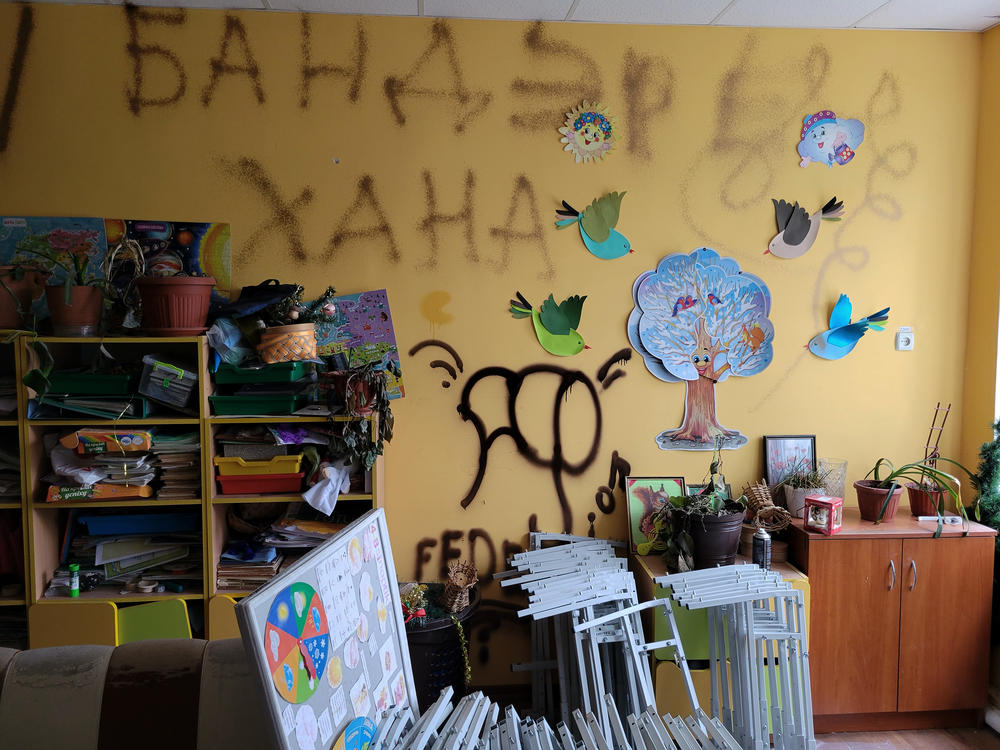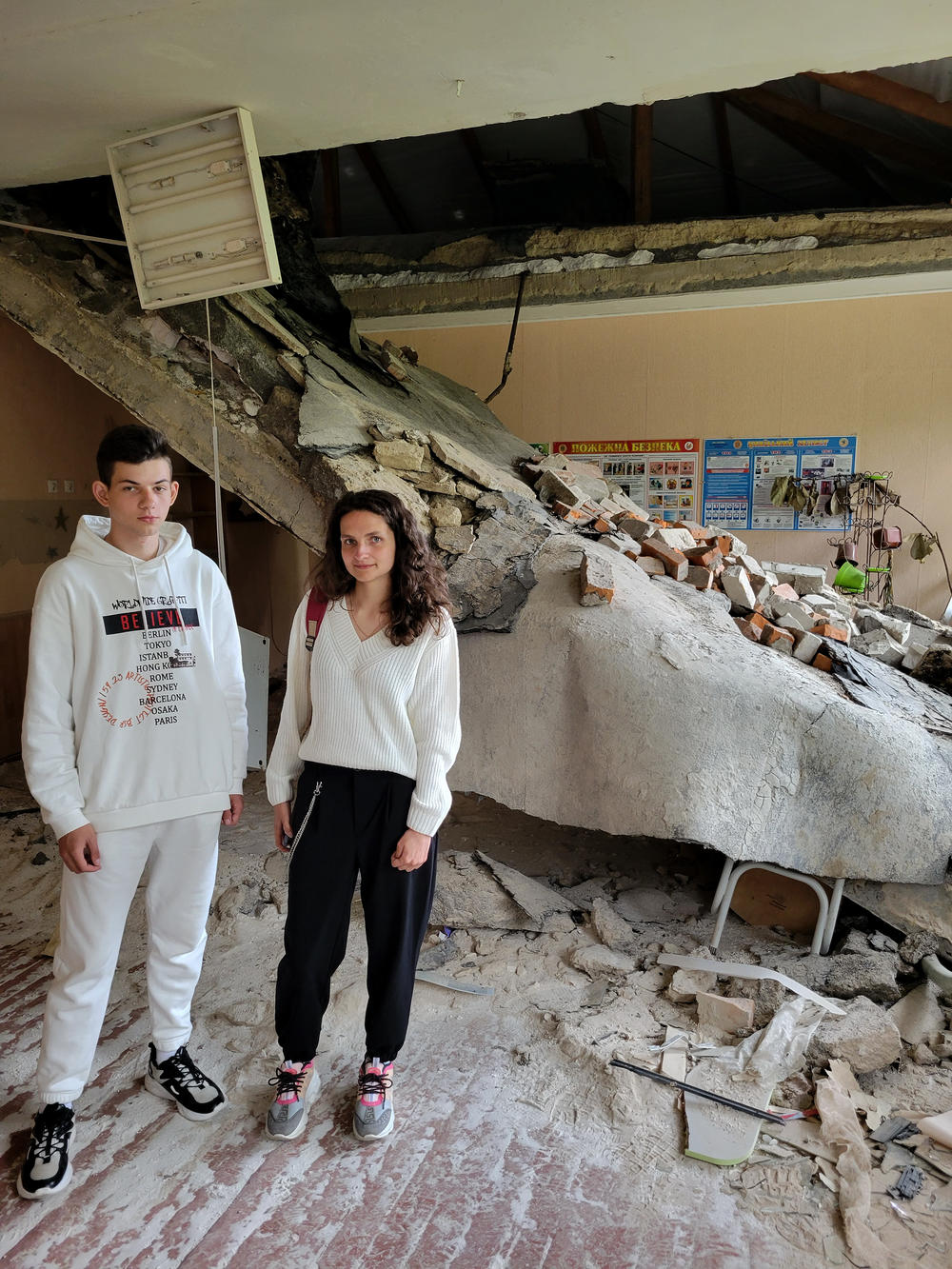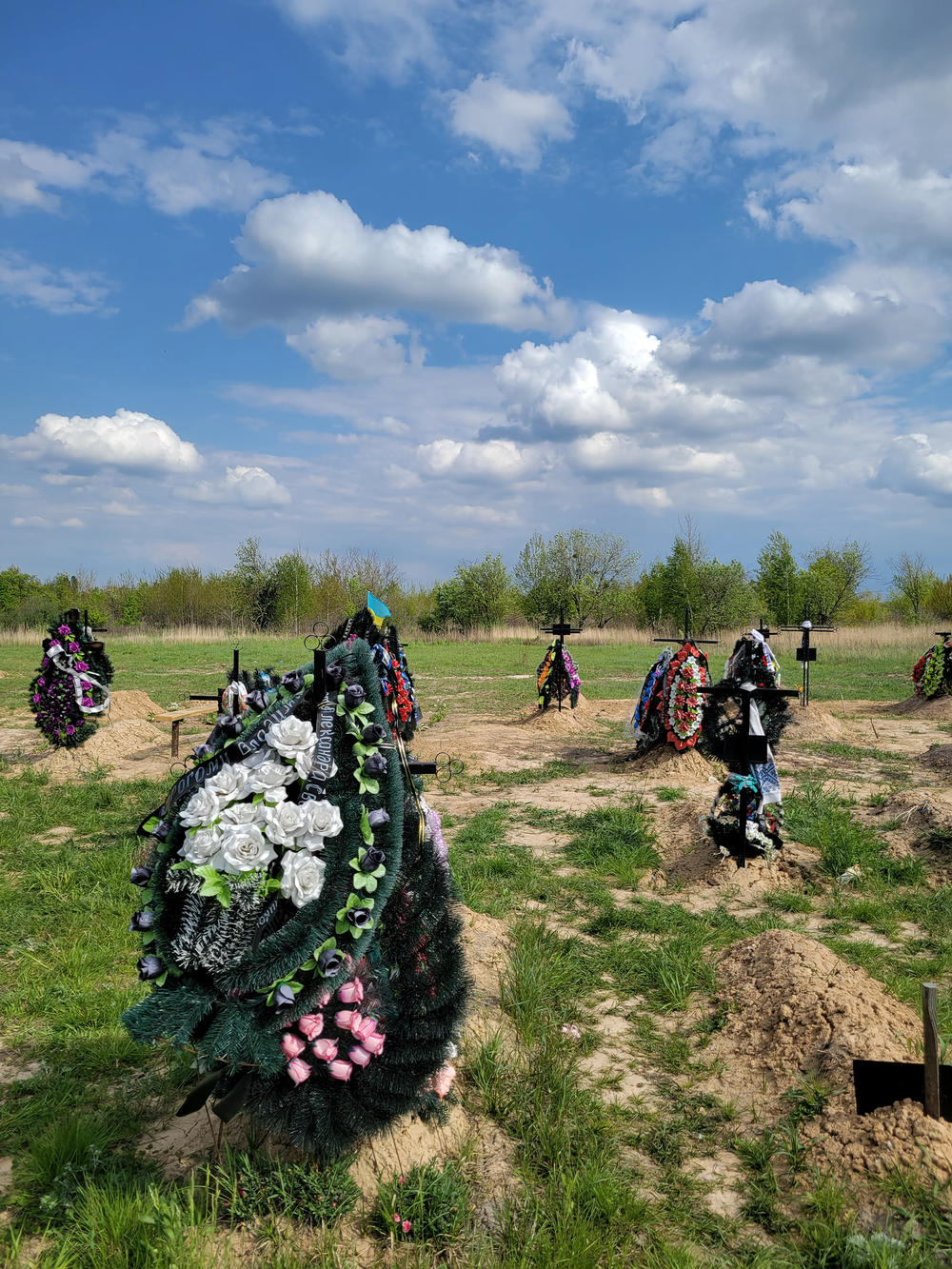Section Branding
Header Content
How a Ukrainian teacher helped students escape Russia's invasion, and still graduate
Primary Content
BORODYANKA, Ukraine — Viktoria Timoshenko's biology classroom is a surreal sight. She didn't recognize it at first, she says.
In March, while her small town of Borodyanka, an hour's drive northwest of Kyiv, was under attack, a Russian shell tore through the wall and ripped down the ceiling. Half of it droops down over a pile of bricks and dust. You can hear the traffic outside now, through the large hole where the windows used to be.
Ukrainian forces liberated this area in April. It took a few weeks, but residents are now trickling back in, assessing the damage, filling in Russian-dug trenches with a backhoe, tending their neglected gardens, and recounting the stories of what they endured, and how.
Timoshenko, 25, with dark curly hair, is in her first year as a teacher. She moved across the country from Melitopol, an area that today is under Russian occupation, and started here last fall. She's a fresh recruit from Teach for Ukraine, a nonprofit that trains and places new teachers in underserved schools.
"To tell you the truth, we didn't take her seriously," says one of her students, 17-year-old Volodymyr Hrabovenko, who goes by Vova. "We were the senior class, the oldest, and she was too young."
Vova is the youngest of six. He's been the school's student body president since eighth grade, organizing holiday parties and events with community leaders. "It's my job to know all the kids," he says.
Soon they all warmed up to Timoshenko. She was honest, and didn't talk down to them. As part of biology class, she taught them about condoms and consent. "I remember what I wanted to know when I was their age," she says. "I tried to give them the material which will be useful for them in the future."
The invasion separates families
But then the future changed. Russia's large-scale invasion of Ukraine began on Feb. 24. Four days later, Vova remembers going to his door and seeing helicopters flying overhead, recognizing them as Russian equipment.
"I was really scared," he says. "At that moment you understand that there is a war. After this understanding you don't have anything anymore. You don't have dreams, you don't have thoughts."
From that point things happened fast. First, Timoshenko, who lived in an apartment building, went to stay with another one of her students, 16-year-old Iryna Emshanova, and her family. They had a basement, providing better shelter.
Vova and his family, meanwhile, were in an especially dangerous part of town. Their power and cellphone connection was out for two days.
Timoshenko called local authorities, begging them to get Vova out. They sent a car to pick up him and his grandmother, while his two grown brothers stayed behind with their mother.
A week passed. Iryna's grandmother offered to house them all even farther from danger, a few hours southeast, in a town called Vinnytsia.
But Vova's grandmother refused. Like so many people, especially older people, all over the country during this war, she couldn't imagine leaving her home region, even when in mortal danger.
"We didn't have enough time to say goodbye," Vova remembers. "The head of the village drove up and said, 'Pick your things up immediately.' So we picked up our things and I came to my granny and I said, 'I'm leaving.' And she said, 'Good. Be safe.'"
On March 16, one week after they parted, a Russian airstrike killed his grandmother. She had just turned 82.
She was like a "second mother," Vova says. She used to take him with her to see her friends in the village, and play cards. He even has a happy memory of her in the bomb shelter, which they shared with neighbors.
"There was a little boy in our shelter, 4 years old, and he couldn't stop asking questions — 'Why are we here? What are we going to do?' He tried to make our grandma play [video games] with him — she didn't understand how to use these modern technologies, but he insisted on playing these games with her," Vova says.
Soldiers come to Vova's house
From mid-March to early May, Timoshenko and Vova lived with Iryna and her family in Vinnytsia. The teenagers enrolled in online classes at the local school — remote learning has continued wherever possible, throughout the country.
Timoshenko helped them with their lessons. They all became very close and made each other laugh. "Before, we were friends," she says in English. "But now after the war, we are like best friends."
Vova had a few of what he called "nervous breakdowns," crying, and not wanting to talk to anyone. The biggest one was when he found out that his grandmother was killed.
"I felt like the world around me disappeared. It became gray. I couldn't breathe," he says.
Timoshenko has tried to keep her emotions bottled up, to stay optimistic. "I had to be strong because my pupils were near me and I'm responsible for them," she says. "And now, when it's a little bit safer, I realize that in some way I postpone my feelings, my thoughts, just because it's not a good time for it. I think that if I start to share my emotions it will be very hard for me to stop."
For her, this was all coming full circle. Eight years ago, when Russian forces invaded Ukraine's Crimea, she was a senior in high school. The war derailed her college plans and put her into a depression. She ended up taking a gap year and making a new plan for her future, one which ultimately brought her to Borodyanka.
Timoshenko's parents are back in her hometown of Melitopol, in southeastern Ukraine. They tell her they are facing shortages of food and water.
For five weeks, Russians first attacked, and then occupied, Borodyanka. Soldiers slept in the school, covering the brightly decorated walls with crude graffiti, looting items like microscopes and video projectors. They used the town's cemetery as a parking lot, says Timoshenko, driving tanks over the headstones.
Russian forces are accused of targeting civilians and schools
One day, after Vova had evacuated, the soldiers came to his house. They saw photographs of him, a young man almost old enough to fight, and asked where he was.
His mother and brother told the truth — they didn't know. So the soldiers beat them, Vova says. And they shot his brother, grazing him in the ear.
The governor of Borodyanka said, as of May 17, at least 150 civilians were identified as being killed during the occupation, and not just by shelling. There are reports of soldiers shooting people too.
Only a few remains of Vova's grandmother's body were found in the shelled house. They are buried in the town's new cemetery, covered with a raw mound of dirt. The cemetery has rows of freshly dug graves, marked for now only with numbers. And open graves, waiting for the bodies that are still being found.
In May, Vova, Timoshenko and Iryna and her family all returned to a village close to Borodyanka. Vova is now living with one of his sisters. Timoshenko is staying in a house that belongs to a family that has left for Poland.
The school has resumed classes online. It's not clear what will happen this fall — the building is severely damaged. The Ukrainian prosecutor general's office, which is cataloging alleged war crimes, says Russian weapons have damaged more than 1,700 educational institutions since February. Targeting civilian infrastructure deliberately is a violation of international law.
But Timoshenko does say that out of 20 members of Vova's senior class, 18, including him, will get their high school diplomas on time.
She is helping him study for his college entrance exam, which the Ukrainian government has postponed until the summer to give students more time to prepare.
He wants to be a journalist, he says. One who tells the truth, not fake news.
And, he says, he will never again live in Borodyanka.
Polina Lytvynova contributed reporting.
Copyright 2022 NPR. To see more, visit https://www.npr.org.



